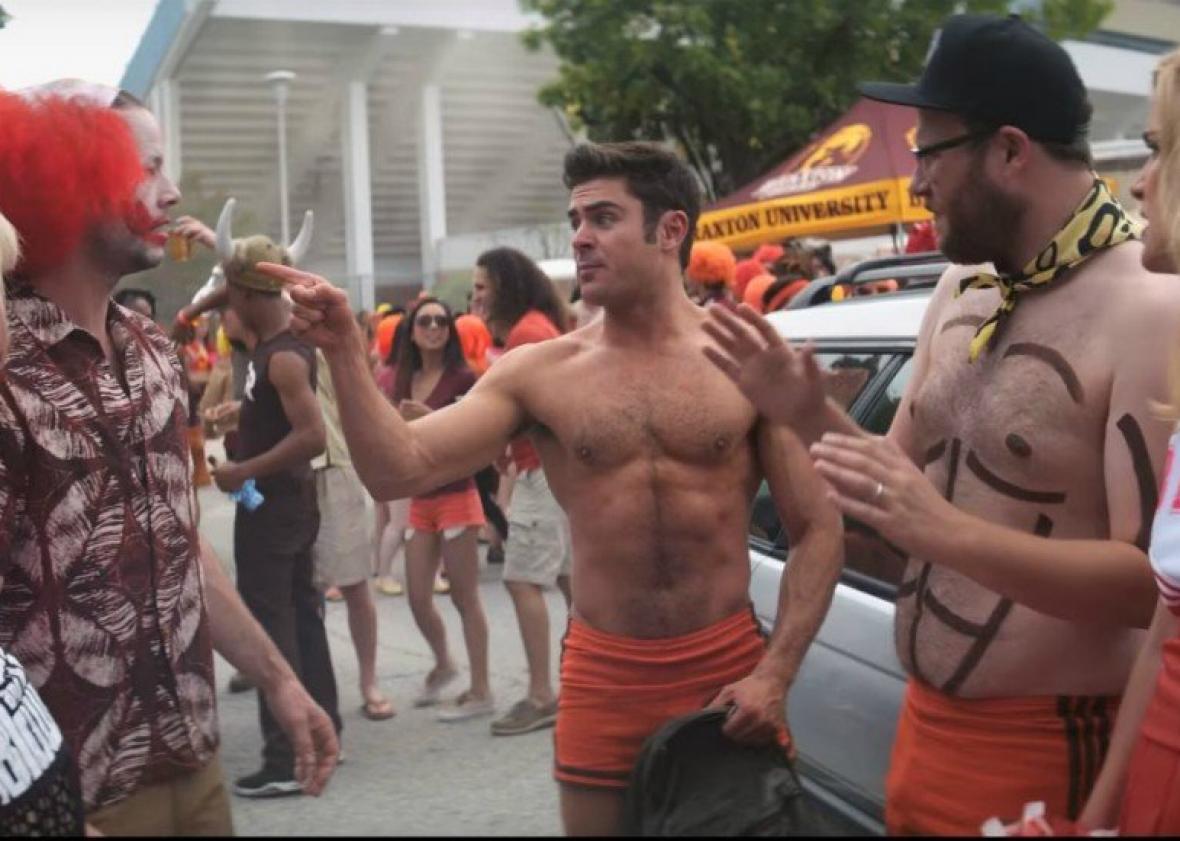This is a song about the tragedy of Teddy, Zac Efron’s omniendearing post–frat bro in Neighbors 2. He is a post–frat bro in multiple senses: He’s graduated from college. His brothers are getting married (to each other) and regretfully sexiling him from their shared house for the last time. More broadly, he is the god of a vanished or at least vanishing world, in which fraternities weren’t widely despised as bastions of misogyny and anti-intellectualism. In which thousands of campus conversations about rape culture hadn’t yet flowered like nightshade in the collegiate garden of Eden. Teddy’s post–frat bro is sweet and lost, newly woke to the fact that mainstream liberal discourse hates frat bros (even as interest in Greek life has surged over the past 10 years). But the saddest thing about him is that he never even existed in the first place.
Most reviewers agree that Teddy is the best thing about Neighbors 2, a funny and fun movie that finds Mac (Seth Rogen) and Kelly (Rose Byrne) trying to sell their house despite the rowdy, weed-peddling 18-year-olds (led by fresh-faced Chloe Grace Moretz) founding their rebel sorority next door. Teddy, an aimless graduate longing for his glory days in Delta Psi, first gloms onto Kappa Nu as a new source of friendship and partying but gets expelled for being “too old.” The betrayed becomes the betrayer when he offers his Grecian expertise to Mac and Kelly, who are trying to bring the sorority girls down.
Slick with oily but wholesome charisma, Teddy as post–frat bro is a feminist’s best-case scenario, a well-meaning, superhot dum-dum who immediately realizes the error of his ways when some freshwomen call him out for sexism. He’s abashed when the Kappa Nu girls tell him that his frat parties had misogynist themes; later, he informs Mac and Kelly that it’s “not cool anymore” to call women hoes. Sexism, in Teddy’s world, is incidental, not indispensable. The core of his philosophy involves friendship (both brotherhood and sisterhood), enthusiasm, and Magic Mike–style sexy dancing. He doesn’t bat an eye at his best friend’s gay wedding and he’s flabbergasted that sororities, unlike fraternities, aren’t allowed to throw their own parties. (“There’s no actual right to party,” Mac tries to explain to him at one point, but it’s like telling a dog his water bowl’s not wet.) This is what we want to believe about dudes in fraternities: They are sweet, deluded boys who curl up with stuffed animals to sleep, fundamentally hold that men and women have an equal right (nay, duty) to get lit, and will run barefoot through the night crying when their friends seek alternative housing arrangements. We want to imagine sexist stereotypes falling away at the first exposure to progressive thought.
And maybe they do, for some. But reversing systemic frat misogyny is not as simple as one good-hearted kid’s personal revelation. Teddy is a melancholy figure, a frat bro adrift in a society that’s hostile to the very idea of him. But he’s also so clearly a fantasy: If only Greek culture were so easily fixed. One of the Kappa Nu sisters calls Teddy “a beautiful centaur.” He appears like a genius loci to help them raise enough money to buy their sorority house—later, his irresistible magic dancing hypnotizes a group of girls while Mac and Kelly try to steal their drugs.
If the defining quality of the frat bro is un-self-awareness, what does it mean to be a woke frat bro? Can frat bros still bro with the dawning understanding that heaven and earth contain more things than are dreamt of in their bro-osophy? Teddy worries constantly about whether his friends “value” him, which is slightly different from whether they like him. Does he matter? Does he bring anything to the table? In this sense, the best reference point for Efron’s mythical hapless dude is not so much Everybody Wants Some!!, the Linklater orgy that saluted Greek life with rose-tinted nostalgia flags, as Magic Mike, about hunks of meat negotiating an economy that has stopped empowering them the way it used to (in part because society has grown less hetero-patriarchal).
Desperation may not be an obvious frat bro accessory, but it’s a richly poignant one. “There’s no I in sorority,” Teddy insists, despite all evidence to the contrary. The comedy here—a sweetly innocuous human punch line can’t locate his I—has a wistful edge. But as catchphrases go, it’s still better than “no means yes.”
